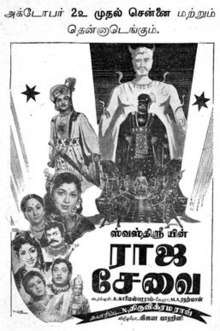Raja Sevai
| Raja Sevai | |
|---|---|
 Theatrical release poster | |
| Directed by | Kamalakara Kameswara Rao |
| Produced by | N. Trivikrama Rao |
| Written by | Thanjai N. Ramaiah Dass (dialogues) |
| Screenplay by | N. Trivikrama Rao |
| Story by | N. Trivikrama Rao |
| Starring |
N. T. Rama Rao Sowcar Janaki S. V. Ranga Rao |
| Music by | T. V. Raju |
| Cinematography | M. A. Rehman |
| Edited by | G. D. Joshi |
Production company |
Swastisri Pictures |
Release date |
|
Running time | 164 mins |
| Country | India |
| Language | Tamil |
Raja Sevai (English: Royal Service) is a 1959 Indian Tamil swashbuckling film, produced by N. Trivikrama Rao under the Swastisri Pictures banner and directed by Kamalakara Kameswara Rao.[2][3] It stars N. T. Rama Rao, Sowcar Janaki and S. V. Ranga Rao in the lead roles,[4] with music composed by T. V. Raju.[1] The film is a remake of the Telugu movie Rechukka Pagatichukka (1959); both movies were made simultaneously by the same banner & director and some of the scenes & artists are the same in both versions.
Plot
Vijayavarman is the chief security officer of King Mahibalan. Mahibalan's younger brother Vikraman captures the kingdom. Vikraman goes for hunting one day. There he meets a girl, Gowri, who is the daughter of the chief of the mountain tribe, Bommanna. He promises that he will marry her and makes love to Gowri. Vikraman returns to the palace and calls for a meeting of local chiefs as he is afraid that the mountain tribes may come and take revenge. In the meantime, Gowri becomes pregnant. Bommanna brings her to the king's court while the meeting with local chiefs was in progress. He demands that Vikraman takes Gowri as his wife. But Vikraman feigns ignorance. Gowri commits suicide in the court itself. Bommanna swears that he will take revenge. Vikraman orders his soldiers to arrest Bommanna, but Vijayavarman objects. Bommanna escapes. Vikraman imprisons Vijayavarman. Bommanna rescues him from the prison and both plan to overthrow Vikraman. The rest of the story deals with many twists and turns. [5]
Cast
List adapted from the database of Film News Anandan[1] and from the film's song book.[5]
|
|
|
Production
The film was produced by N. Thrivikrama Rao, who also wrote the story, under the banner Swasthi Sri Pictures and was directed by Kamalakara Kameswara Rao. The dialogues were penned by Thanjai N. Ramaiah Dass. Cinematography was handled by M. A. Rahman while the editing was done by G. D. Joshi. A. Krishnan was in charge of audiography while the recordings were done by K. Harinath. Vembatti Satyam handled the choreography and the still photography was done by R. N. Nagaraja Rao.[1][5]
The film was simultaneously produced in Telugu[1] with the title Rechukka Pagatichukka and in Kannada with the title Rajashekara.[3]
Soundtrack
Music was composed by T. V. Raju while the lyrics were penned by Thanjai N. Ramaiah Dass. Playback singers are P. Leela, S. Janaki, P. Susheela, A. P. Komala, Thiruchi Loganathan, A. L. Raghavan, Ghantasala and S. C. Krishnan.[6]
| No. | Song | Singer/s | Duration (m:ss) |
|---|---|---|---|
| 1 | "Konjum Kanne Kumaaraa" | P. Leela | |
| 2 | "Paruva Kaalam Thavari Ponaal" | S. Janaki | |
| 3 | "Baleh Pervali Kannappaa" | Thiruchi Loganathan & A. L. Raghavan | 01:41 |
| 4 | "Kaadai Kauthaarigale" | A. L. Raghavan & S. Janaki | 03:05 |
| 5 | "Kannaana Kanmaniye" | P. Leela & group | 04:11 |
| 6 | "Mudiyaadhu Solla Mudiyaadhu" | Ghantasala & P. Susheela | 02:42 |
| 7 | "Thoodhu Sellaayo" | 03:27 | |
| 8 | "Konangi Kullaa Poattu" | A. L. Raghavan & A. P. Komala | 04:16 |
| 9 | "Kaadhal Kadhaigal Pesi" | P. Susheela | |
| 10 | "Onghaara Kaali Maahaali" | S. C. Krishnan & group | 02:25 |
References
- 1 2 3 4 5 Film News Anandan (23 October 2004). Sadhanaigal Padaitha Thamizh Thiraipada Varalaru [History of Landmark Tamil Films] (in Tamil). Chennai: Sivakami Publishers. Archived from the original on 4 September 2017.
- ↑ "Raja Sevai (Direction)". Filmiclub.
- 1 2 Ashish Rajadhyaksha & Paul Willemen. Encyclopedia of Indian Cinema (PDF). Oxford University Press, New Delhi, 1998. pp. 119, 633.
- ↑ "Raja Sevai (Cast & Crew)". gomolo.com.
- 1 2 3 Raja Sevai Song book. The B. N. K. Press (Private) Ltd., Chennai 26.
- ↑ G. Neelamegam. Thiraikalanjiyam — Part 1 (in Tamil). Manivasagar Publishers, Chennai 108 (Ph:044 25361039). First edition December 2014. p. 185.